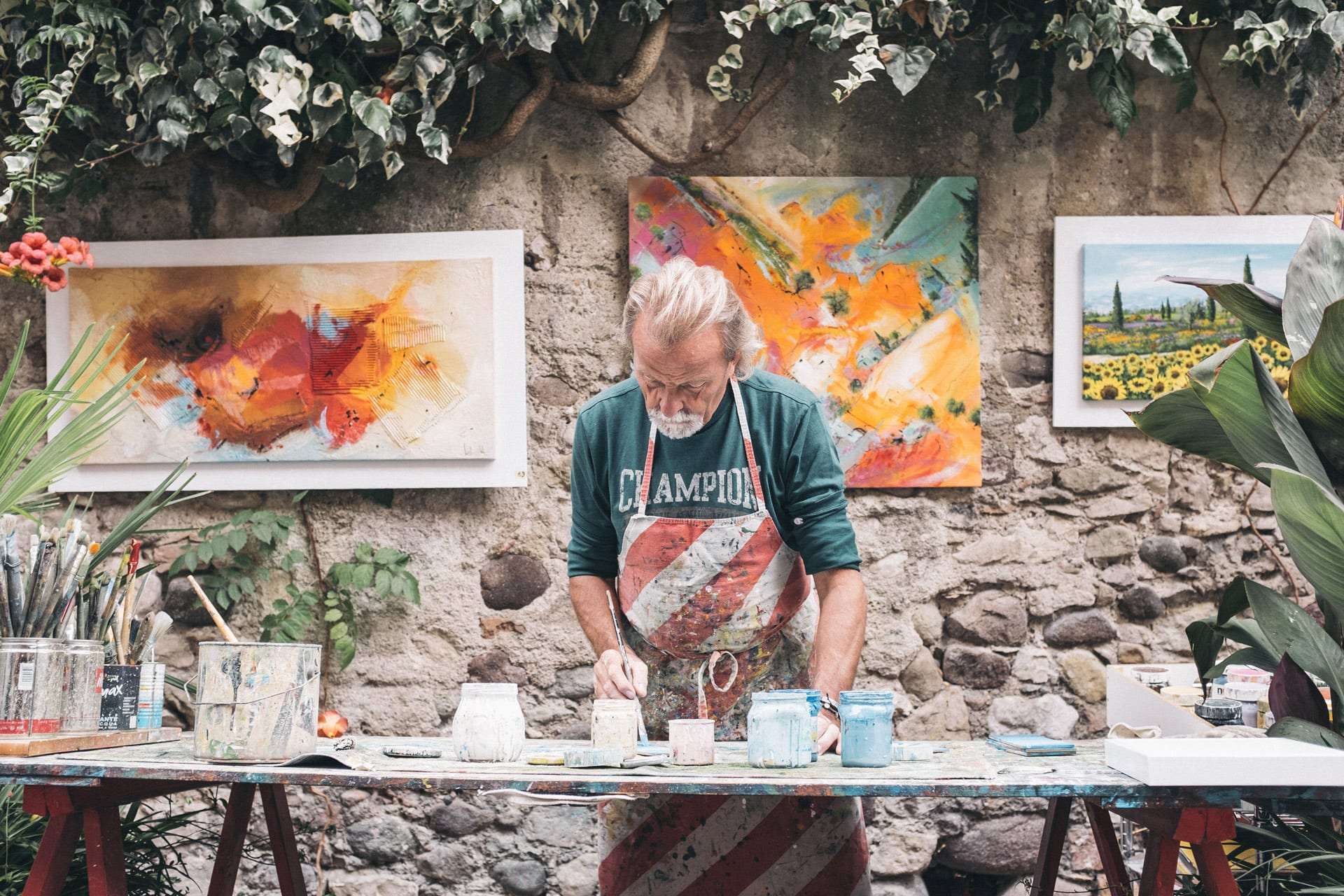Art – no matter whether you choose to create it yourself or simply observe and enjoy it – is a relaxing and inspiring activity for many people. However, the particular benefits of artistic expression go much further than relaxation and enjoyment. Studies suggest that art therapy can be very valuable in treating issues such as depression, anxiety, post-traumatic stress disorder and even some phobias. It is a great way to express your emotions without words, process complex feelings and find relief. In this article, we will take a closer look at art therapy and discuss its mental health benefits.
What Is Art Therapy?
Art therapy can be defined in many ways, but the simplest way to define it is an application of the visual arts in a therapeutic context. You don’t necessarily have to see a therapist in order to experience some of the therapeutic benefits of artistic expression. There are many simple activities you can try from the comfort of your home such as art journaling, sketching, making collages, sculpting with clay, etc. It doesn’t matter what media you choose. The only thing that matters is that you feel comfortable using it.
However, working with a licensed therapist also has its advantages because a professional can tailor each activity to your own needs. If the activities are done in a group, they are excellent for building healthy connections with other people, which may be very helpful if you are fighting depression. The most important thing is that you should try art therapy only if you want it. Expressing yourself through art can be self-revealing and sometimes equally painful as talking. So, if you still don’t feel ready to try it, that is okay.

Who Should Try Art Therapy?
Anyone who feels overwhelmed or pressured by the hectic world we live in should try art therapy. Creating art will give you a chance to slow down and explore any issues you may be having. Art therapy improves the mental health of people who are dealing with addictions, anxiety, attention disorders, grief and loss, dementia, depression, eating disorders, physical illness, PTSD, trauma, relationship issues and much more.
Since the focus is on the process and not the final product, art therapy is not about becoming a great artist but about finding meaning and connection in your life. All you need for it is a willingness to experiment.
Mental Health Benefits of Art Therapy Activities
Art therapy can be used as a complement to traditional mental health treatment. The aim is to manage behaviors, process feelings, reduce stress and anxiety, and increase self-esteem.
- Self-discovery: Creating art can help you acknowledge and recognize feelings that have been lurking in your subconscious.
- Self-esteem: The process will give you a feeling of self-accomplishment which can be very valuable to improve your self-appreciation and confidence.
- Emotional release: The greatest benefit of art therapy is giving you a healthy outlet for expressing and letting go all your feelings and fears. Complex emotions such as sadness or anger sometimes cannot be expressed with words. When you are unable to express yourself, but you desire emotional release, making art may help you to do it.
- Stress relief: Fighting anxiety, depression or emotional trauma can be very stressful for you both mentally and physically. Creating art can be used to relieve stress and relax your mind and body.

It is very important to know that you don’t have to be a talented artist in order to try art therapy. Human beings are innately creative, and all you need to do to complete an art therapy activity successfully is, to be honest with yourself and your emotions. Once you unleash your creativity, your inner artist will quickly wake up.
Studies also show that creating art stimulates the release of dopamine. This chemical is released when we do something pleasurable, and it basically makes us feel happier. Increased levels of this feel-good neurotransmitter can be very helpful if you are battling anxiety or depression.
Mental health professionals and experts agree that art therapy has many benefits, from boosting your self-esteem, and providing you a safe outlet to relieve your emotions, to giving you a sense of control over your life and helping you to get to know and understand yourself better. During the process of art creation, you will be taking yourself on a journey of self-discovery that will help you eliminate emotional roadblocks, and learn how to communicate with yourself and others.
Get our latest articles direct to your mailbox.
___
Join our mailing list for more articles written by family members, people with lived experience, and mental health professionals.
Get Tips to Your Inbox
 Author Bio: Mary Ann Cohen is considered one of the nation’s most successful and respected art dealers with over 35 years of International visual fine art experience. She actively encourages the use of art therapy in her galleries.
Author Bio: Mary Ann Cohen is considered one of the nation’s most successful and respected art dealers with over 35 years of International visual fine art experience. She actively encourages the use of art therapy in her galleries.
One in five Americans experiences a mental health problem every year, but when it happens to someone you love, it can feel like you are all alone.
Laurel House, Inc., the sponsor of www.rtor.org and its free support services, has produced a 4-minute video about Resources to Recover and a family’s journey from heartbreak to healing.
See the Film
The opinions and views expressed in this guest blog do not necessarily reflect those of www.rtor.org or its sponsor, Laurel House, Inc. The author and www.rtor.org have no affiliations with any products or services mentioned in this article or linked to herein.
Recommended for You
EXAMPLE ACTIVITIES
IN ADVERTISING
On occasion, non-art therapist practitioners might be found to advertise their services as “art therapy.” This is an inaccurate use of the term, as art therapy can only be practiced by an individual who possesses the required training, certification, and/or state licensure. Bona fide art therapy is beyond the scope of practice of non-art therapists.
IN WORKSHOPS
Another context in which art therapy may be inaccurately categorized includes professional trainings that furnish a certificate upon completion, which may mislead the participant to believe that he or she can practice art therapy. These sorts of trainings, workshops, and the like, give attendees the erroneous impression that art therapy is a modality rather than a profession.
To prevent this problem, facilitators are advised to adhere to the AATA’s Ethical Principles: “When providing training and/or supervision to non-art therapists, art therapists take precautions to ensure that trainees understand the nature, objectives, expectations, limitations, and resulting qualifications of the supervision and/or training as distinct from formal studies in art therapy” (8.6). As such, a disclaimer should be used to alert attendees accordingly.
Few things in life have the power to stir our emotions and evoke compelling responses in the way art does. In all of its various forms, art is a powerful tool for expression. Through visual means, an artist can communicate and connect with others in a way that transcends words, and art therapy utilizes this connection to strengthen recovery.
The compelling quality of art makes it an incredibly useful tool in psychotherapy and counseling. Creative activities, in the form of art therapy, become a type of language that allows people to communicate thoughts and feelings that are too difficult or painful to put into words.
What Is Art Therapy?
Art therapy is a type of therapy that uses art and artistic mediums to help people explore thoughts and emotions in unique and visually expressive ways. Art therapy at Destinations for Teens involves the application of visual arts and the creative process within a supportive therapeutic environment. Our goal in art therapy is to support, maintain, and improve the psychosocial, physical, cognitive, and spiritual health of the teens in our care.
Art therapy is facilitated by a trained, qualified professional with knowledge of visual art — drawing, painting, photography, sculpture, and other art forms — and the creative process and human development and counseling theories and techniques.
From the patient’s perspective, art therapy does not require experience or special talent. The work is not criticized or judged for its artistic quality, precision, or beauty. The methods used and the resulting artwork are more about the emotions expressed and felt throughout the process.
Helping Teens Express Themselves
The use of nonverbal expression can be especially beneficial for adolescents who are navigating the difficult waters of their teen years. Normal developmental changes, family tensions, and social challenges may be further complicated by symptoms of psychological concerns.
Teens often see art therapy as a non-threatening form of treatment. The artwork they produce helps the therapist gain a better understanding of their concerns and life circumstances, especially those situations that are too risky to reveal or too embarrassing to talk about. This awareness better equips the therapist in efforts to protect and support them.
In art therapy, teens can express themselves in a context of gentle guidance that assists them in self-discovery and growth. The creative process helps them develop an understanding of their own inner voice, establish an identity, examine values and morals, question authority, and make future plans.
Benefits of Art Therapy
The positive results of art therapy are broad-ranging and provide benefits for anyone wishing to learn more about themselves or explore the creative arts as a means of self-expression. But art therapy holds specific benefits for those suffering from a wide spectrum of mental illnesses.
Under the guidance of a trained expert, art therapy can help improve various mental and physical symptoms, bringing significant relief and promoting recovery from debilitating mental disorders. In addition to addressing specific symptoms, art therapy offers many general benefits, such as:
- Offering a non-threatening way to express inner feelings that can be difficult to put into words
- Fostering a feeling of being understood, relieving frustration
- Providing a safe outlet for feelings such as fear, guilt, pain, rage, and anger
- Gaining skills and a sense of achievement, providing ownership of successes
- Building trust, which is encouraged in a safe environment
- Increasing self-esteem and self-respect
- Developing objective perspectives on conditions, challenges or difficult life circumstances
- Experimenting with change that can be applied outside therapy
- Encouraging realization of existing personal strengths and the confidence to use them
- Improving social skills, especially for someone who may be withdrawn or shy
Addiction Treatment Programs
At Destinations for Teens, we believe in a holistic approach that is client-centered and customized to consider all aspects of mind, body, and spirit. Let our team of professionals guide your child through everything from residential treatment to alumni support that continues long after the end of successful therapy.
Keeping Your Teen Sober Means Getting Involved
It is important to realize that drinking and drug use have become normal aspects of the adolescent experience in this country. Refusing to take part in this common rite of passage can be an uphill battle for teens. You may think your child has strong decision-making skills, but it can sometimes only take one drink to become intoxicated, and then their judgment will be severely impaired. Talk to them about the dark side of teen drinking and how easy it is to lose control.
Art therapy can help teens understand, express, and improve their mental and emotional conditions. Since it can raise the quality of life for many, art therapy is worth considering as a catalyst for healing mental illness.
To learn more about the power of art therapy or to inquire about our addiction treatment services, give us a call at 877.466.0620.




